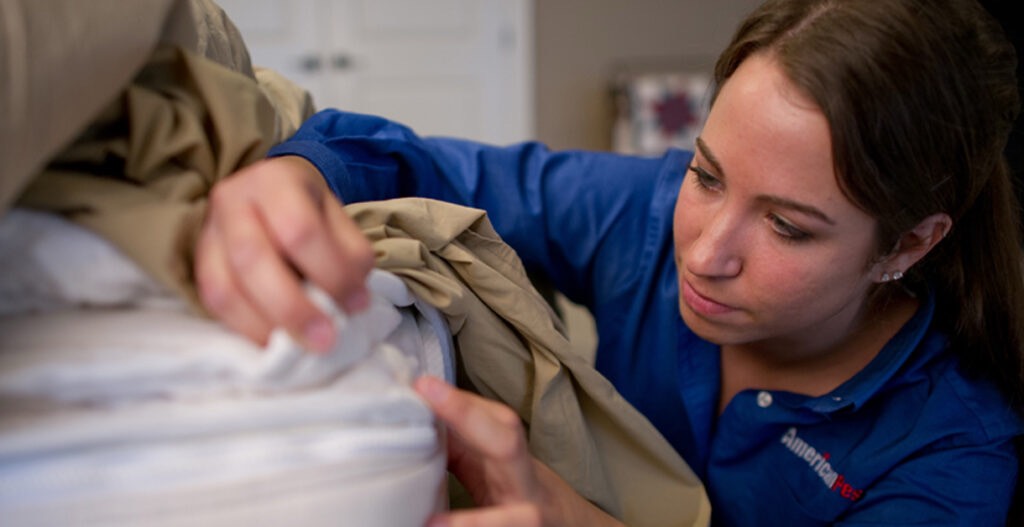Every time we turn around, there seems to be another news story about bed bugs. These blood-eating pests are being found in libraries, movie theaters, retirement homes, daycares, retail stores, apartment complexes, and the list goes on and on. In this article, we’re going to focus on schools–specifically kindergarten through twelfth grade. If you’re a parent of a student, here’s what you need to know.
HOW BED BUGS SPREAD

These are hitchhiking pests. Understanding how they spread is key in preventing them from spreading to your home.
There is a belief that bed bugs only infest dirty homes. This is not true. They have been found infesting the cleanest of environments. This is because bed bugs are not drawn to filth. They are attracted to areas where humans sleep or lounge. Therefore, they can be brought into a school on any child, which makes controlling the spread of these bugs difficult. It isn’t a simple matter of checking students for proper hygiene.
It is also important to point out that bed bugs can come in on teachers and staff. This pest is not limited to traveling only on children. An immature bed bug nymph is as small as the tip on a pen and mostly transparent. This is not a bug you’re going to easily notice.
Why do teachers, staff, or students bring bed bugs in from their home? Don’t they know that bed bugs spread this way? Yes. And, while some may go to school knowing that they have a bed bug infestation, most don’t realize they have one. Bed bug infestations often go unnoticed for months. During this time, everyone living in the home has the potential to spread bugs to another location.
How can an infestation go on for months? Don’t bed bugs leave painful welts when they bite? They can. But they don’t always leave welts. As much as 30% of people who are bitten have no reaction to these bites, even when bitten repeatedly. A slightly higher percentage have no reaction at first but develop a more pronounced reaction over time.
There are two primary ways bed bugs spread to schools, and subsequently, to other homes. Immature bed bugs get into objects that are carried to and from school or they lay eggs on these items. The spread of a bed bug infestation by immature nymphs requires these bugs to crawl from an infested item to another item. The spread of an infestation by eggs usually occurs when an object is transferred from one student to another. This may be an item of clothing, a book, a bag, a piece of furniture, or even an electronic device.
How To Protect Against An Infestation
DIY methods for preventing an infestation of bed bugs are a lot of work and are not 100% effective. Since these are hitchhiking bugs, a focus must be placed on inspecting items that come and go from your home.
- Wash clothing on the hottest temperature to kill bed bugs in all stages of development.
- Check all objects coming and going for tiny white eggs, black streaks, blood stains, insect casings, or these tiny bugs.
- Keep active communication with you children about what bed bugs look like and what signs to be aware of.
- Keep clutter in your home to a minimum so it is easier to see signs of these bugs.
- Check mattresses, box springs, and upholstered furniture periodically for black streaks, black patches, tiny black droppings, shed insect casings, brown blood staining, tiny white eggs, or the bugs themselves.
The best and easiest way to get rid of bed bugs is to have a pest controller do routine K9 Bed Bug Inspections. Dogs have a powerful sense of smell that allows them to locate these pests. This is a method used by resorts and hotels to maintain a bed-bug free environment for their guests. Without routine inspections, it is impossible to safeguard against a bed bug infestation. These insects don’t come in from your yard. They come in on you, your spouse, your kids, your extended family, your friends, and the friends your kids invite over.
Make K9 Detection Services a part of your ongoing pest plan. Reach out to us today to schedule service and get your defenses in place before these bugs take root.
Contact Us Today!
Do you need an estimate for service or have questions about pests? We’d love to hear from you!
Fill out the form and receive feedback today. For immediate service, please call or chat.

